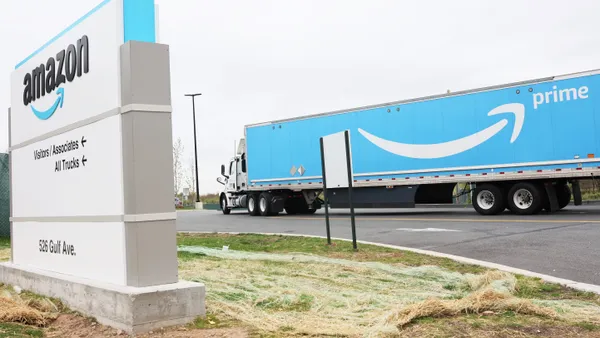Dive Brief:
- Uber Freight's logistics and brokerage platform goes "well beyond" other new entrants in the digital freight matching space, Morgan Stanley analysts wrote in a research note emailed to Supply Chain Dive. Analysts described Uber Freight as a "significant freight/logistics platform" built over a short period of time.
- The analysts expect Uber Freight to roll out flatbed services, in addition to existing services in dry van and reefer. Morgan Stanley notes the platform has already been trialing 35 flatbed customers "for some months now."
- Morgan Stanley listed C.H. Robinson and Landstar as underweight (meaning the stock's return is expected to be below the average return for the industry). Uber Freight's "impending entrance into the flatbed arena could put significant competitive pressure on [Landstar]," the note said.
Dive Insight:
Digital freight brokerage often earns a reputation as a highly saturated market with many new entrants vying for space, including startups Convoy, Loadsmart and Transfix.
In addition, the overall digitalization of the freight industry, whether caused by startups or a general trend, has pushed traditional brokers such as C.H. Robinson, J.B. Hunt and GlobalTranz to add digital components to their portfolios.
Yet Morgan Stanley's analysis paints a picture in which Uber Freight emerges as the clear stronghold in digital freight matching.
The analysts noted Uber Freight is driving growth more through innovation rather than aggressive pricing to undercut the market. This analysis contrasts an earlier note from Morgan Stanley, reported by The Wall Street Journal, which found Uber Freight offered rates to shippers below market rate in an effort to disrupt the market and delay profitability until it captures greater market share. The most recent research says Uber Freight has added tools related to route optimization, dynamic scheduling and facility data and reviews.
And it's not just software where Uber Freight is innovating and expanding. Since Uber Freight launched more than two years ago, the platform has built up a network of 50,000 carriers and more than 500,000 trucks, with more than one million downloads of its app, according to Morgan Stanley. Neither Convoy nor Transfix responded to questions by press time on the size of their networks. In February, Convoy said it was working with 100,000 truckers, around 35,000 carriers and more than 500 shippers.
Large brokers still hold some advantages over Uber Freight, as they have established relationships with tens of thousands of carriers. But Morgan Stanley analysts say Uber Freight's rapid growth, especially as it enters the flatbed market, could even pose disruption to established players, namely Landstar.














